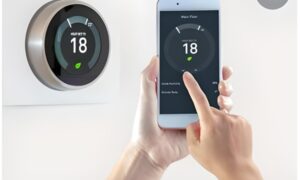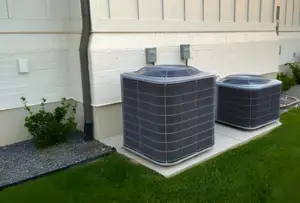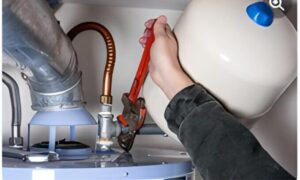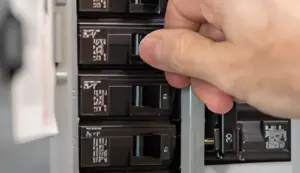Heat pumps are a popular and energy-efficient solution for heating and cooling homes. However, like all mechanical systems, heat pumps can experience problems from time to time.
Understanding the common heat pump problems and how to fix them can help you keep your system running smoothly and avoid costly repairs.
In this article, we will cover some of the most common heat pump problems, like no heat or lack of heat, blowing warm air instead of cooling, poor airflow, and so on.
By familiarizing yourself with with these potential issues and their causes,, you can be better prepared to determine if the problem can be solved by yourself or if you require the assistance of a professional HVAC technician
Table of Contents
Frozen Evaporator Coils:
A frozen evaporator coil in a heat pump is a common problem that occurs when the coil becomes coated in ice or frost, reducing the flow of warm air into the home.
The evaporator coil is responsible for absorbing heat from the surrounding air and transferring it to the refrigerant, which then circulates to the outdoor unit where it is released.
When the evaporator coil becomes clogged with dirt, dust, and other debris, the airflow around the coil is reduced, causing the refrigerant to cool and form ice on the coil.
The ice can then insulate the coil, preventing it from absorbing heat and reducing the efficiency of the heat pump.
There are several ways to fix a frozen evaporator coil:
Clean or replace the air filter: A dirty air filter can restrict airflow and cause the evaporator coil to freeze. Clean or replace the filter to improve airflow.
Clear debris from the outdoor unit: Ensure the outdoor unit is free of leaves, branches, and other debris that can block airflow.
Check for a level outdoor unit: An outdoor unit that is not level can cause the refrigerant to circulate improperly, leading to a frozen evaporator coil.
Check for refrigerant leaks: If the refrigerant level is low, the coil may freeze. A professional HVAC technician can repair any leaks and recharge the refrigerant if needed.
If the problem persists or if you are not confident in fixing the issue, it is recommended to call a professional HVAC technician for repair. They can diagnose the problem and repair or replace the necessary parts to get your heat pump back in working order.
Lack of Heat:
A lack of heat in a heat pump can be caused by several factors. Here are some common causes and solutions:
Thermostat issues: Check the thermostat setting to make sure it is set to “heat.” Also, check the batteries or replace the thermostat if needed.
Circuit breaker: The heat pump may have tripped the circuit breaker. Check the breaker box and reset the breaker if necessary.
Outdoor unit: Make sure the outdoor unit is functioning properly and is free of debris. Also, check for any damage to the unit that may prevent it from working correctly.
Refrigerant leaks: If the refrigerant level is low, the heat pump may not be able to provide heat. A professional HVAC technician can repair any leaks and recharge the refrigerant if needed.
Air filter: A dirty air filter can restrict air flow, causing the heat pump to work less efficiently. Clean or replace the air filter to improve performance.
No Cooling:
A lack of cooling in a heat pump can be caused by several factors. Here are some common causes and solutions:
Thermostat issues: Check the thermostat setting to make sure it is set to “cool.” Also, check the batteries or replace the thermostat if needed.
Outdoor unit: Make sure the outdoor unit is functioning properly and is free of debris. Also, check for any damage to the unit that may prevent it from working correctly.
Air filter: A dirty air filter can restrict air flow, causing the heat pump to work less efficiently. Clean or replace the air filter to improve performance.
Ductwork: Check for any leaks or blockages in the ductwork that may prevent the cool air from reaching the living spaces.
Refrigerant leaks: If the refrigerant level is low, the heat pump may not be able to provide cooling. A professional HVAC technician can repair any leaks and recharge the refrigerant if needed.
Poor Air Flow:
Poor airflow in a heat pump can lead to reduced comfort and efficiency. Here are some common causes and solutions:
Dirty air filter: A dirty air filter can restrict airflow and reduce the efficiency of the heat pump. Clean or replace the air filter to improve performance.
Blocked indoor and outdoor units: Make sure both the indoor and outdoor units are free of debris, leaves, and other objects that can block airflow.
Leaks or blockages in the ductwork: Check the ductwork for any leaks or blockages that may prevent the air from flowing freely. Repair any leaks and clear any blockages to improve airflow.
Fan issues: The fan in the indoor unit may be malfunctioning or the fan belt may be broken. A professional HVAC technician can repair the fan or replace the fan belt if needed.
Read Also: HVAC Air Filters.- Care & Maintenance
Thermostat Issues:
Thermostat issues can cause problems with the performance and efficiency of a heat pump. Here are some common causes and solutions:
Incorrect thermostat setting: Check the thermostat setting to make sure it is set to the correct mode for heating or cooling.
Dead batteries: If the thermostat display is blank, replace the batteries.
Calibration: Make sure the thermostat is calibrated correctly. If it is not, a professional HVAC technician can calibrate it for you.
Thermostat location: The thermostat should be located away from sources of heat or cold that can affect its readings, such as windows, doors, and vents.
Wiring problems: Loose or damaged wiring can cause issues with the thermostat. If you are not familiar with electrical wiring systems, always seek professional electrical service. He will inspect the wiring and repair any problems.
Read Also: Save Energy with Smart Thermostat
Can I Repair My Heat Pump on My Own?
In some cases, simple maintenance tasks such as cleaning the air filter or checking the thermostat setting can be performed by a homeowner.
However, most repairs and troubleshooting of a heat pump system should be performed by a trained and licensed HVAC technician.
This is because heat pumps contain refrigerant and electrical components that can be dangerous to work with if you are not trained and equipped to do so.
Additionally, improper repairs can cause further damage to the heat pump or even pose a safety hazard.
If you are unsure about a specific repair or if the problem is complex, it is always best to consult a professional HVAC technician to ensure that the repair is done correctly and safely.
They will have the training, experience, and tools to diagnose the problem, repair it, and get your heat pump back in working order.
Why does Heat Pump maintenance need a professional HVAC technician?
Heat pump maintenance requires a professional service for several reasons:
Complexity: Heat pumps are complex systems that consist of multiple components, including refrigerant lines, electrical wiring, fans, and controls. A professional HVAC technician has the training and experience to diagnose and repair problems with these components.
Safety: Heat pumps contain refrigerant, which is a hazardous substance. Only trained and licensed technicians should handle refrigerant, as improper handling can lead to health and safety hazards.
Proper functioning: Regular maintenance by a professional HVAC technician can ensure that the heat pump is functioning correctly and efficiently. They can identify potential problems before they become serious, which can save money and energy in the long run.
Code compliance: Some repairs or installations may require permits and inspections to ensure that they are in compliance with local building codes and safety regulations. A professional HVAC technician will be familiar with the codes and regulations and can ensure that the work is done properly and safely.
Warranty protection: Many heat pump manufacturers require regular maintenance by a professional HVAC technician in order to maintain the warranty on the equipment.
How to Find – HVAC Technician Near Me
HVAC contractors: Look for licensed HVAC contractors in your local area. You can search online or use directories such as the Yellow Pages or Angie’s List to find a contractor near you.








